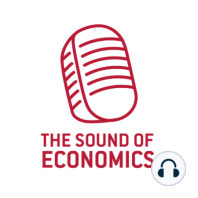16 min listen

S5 Ep23: Deep Focus: Balancing distributional inequalities of climate policies
S5 Ep23: Deep Focus: Balancing distributional inequalities of climate policies
ratings:
Length:
13 minutes
Released:
Dec 7, 2018
Format:
Podcast episode
Description
**Bruegel fellow Georg Zachmann talks through a Bruegel Blueprint he has co-authored, looking into the potential distributional effects of climate policies, in another episode of the Deep Focus series.**
Climate change is one of the big questions of this century, and mitigating its effects remains an enormous challenge. Decarbonisation will require a massive shift in our economies. Heating, transport, electricity and industry will have to transition to a world without fossil fuels. Agriculture and industry will have to find new ways to reduce emissions. This aim – as ambitious as it is essential – necessitates intrusive climate policies.
In this episode of Deep Focus, Sean Gibson interviews Georg Zachmann, a co-author of a recently published [Blueprint on distributional effects of climate policies](http://bruegel.org/2018/11/distributional-effects-of-climate-policies/). They untangle the complicated picture of said effects, which may vary depending on the policy tool and its design, the sector addressed and the initial socio-economic conditions in the country. Some policy tools such as carbon taxes may leave low-income households worse off, while policies such as taxes on aviation may leave them better off relative to high-income households. Others, like public investment and agriculture policies, still have unclear effects.
One thing is for certain: whatever distributional effects climate policies may have, they constitute no argument against their implementation. Climate change would leave everyone worse off and disproportionately hit the poorest part of the population. It is therefore essential to design policies in a way that minimises the adverse effects on those most vulnerable.
For further reading, you might consider an [opinion piece](http://bruegel.org/2018/11/what-the-gilets-jaunes-movement-tells-us-about-environment-and-climate-policies/) by Simone Tagliapietra and Georg Zachmann on what the “gilets jaunes” movement tells us about environment and climate policies, as well as their [blog post on the EU energy industry transformation](http://bruegel.org/2017/09/reinforcing-the-eu-energy-industry-transformation-stronger-policies-needed/).
Climate change is one of the big questions of this century, and mitigating its effects remains an enormous challenge. Decarbonisation will require a massive shift in our economies. Heating, transport, electricity and industry will have to transition to a world without fossil fuels. Agriculture and industry will have to find new ways to reduce emissions. This aim – as ambitious as it is essential – necessitates intrusive climate policies.
In this episode of Deep Focus, Sean Gibson interviews Georg Zachmann, a co-author of a recently published [Blueprint on distributional effects of climate policies](http://bruegel.org/2018/11/distributional-effects-of-climate-policies/). They untangle the complicated picture of said effects, which may vary depending on the policy tool and its design, the sector addressed and the initial socio-economic conditions in the country. Some policy tools such as carbon taxes may leave low-income households worse off, while policies such as taxes on aviation may leave them better off relative to high-income households. Others, like public investment and agriculture policies, still have unclear effects.
One thing is for certain: whatever distributional effects climate policies may have, they constitute no argument against their implementation. Climate change would leave everyone worse off and disproportionately hit the poorest part of the population. It is therefore essential to design policies in a way that minimises the adverse effects on those most vulnerable.
For further reading, you might consider an [opinion piece](http://bruegel.org/2018/11/what-the-gilets-jaunes-movement-tells-us-about-environment-and-climate-policies/) by Simone Tagliapietra and Georg Zachmann on what the “gilets jaunes” movement tells us about environment and climate policies, as well as their [blog post on the EU energy industry transformation](http://bruegel.org/2017/09/reinforcing-the-eu-energy-industry-transformation-stronger-policies-needed/).
Released:
Dec 7, 2018
Format:
Podcast episode
Titles in the series (100)
European Fiscal Rules: The sound of economics is a series of podcasts about economic policy, brought to you by Bruegel. Each episode will look at a key economic policy debate, discuss why it is important and explore some of the work that Bruegel's researchers have done in t... by The Sound of Economics